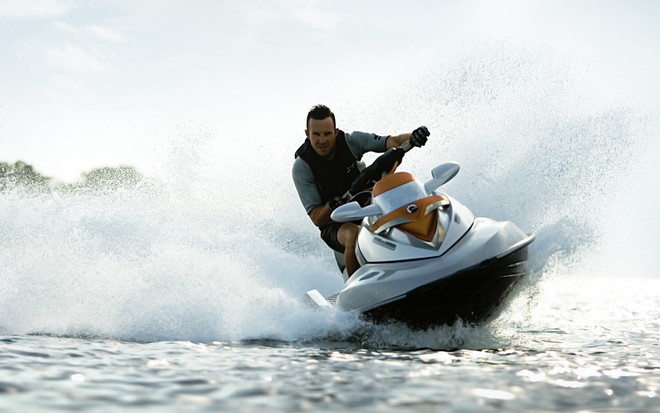New jet ski laws welcomed by industry and Marine Qld
by Jeni Bone on 22 Apr 2011

The new laws are welcomed by Gold Coast jet ski operators and Marine Qld. SW
Jet ski operators on Queensland's Gold Coast are relieved that the state government has chosen to ignore a Coroner's recommendations which would have forced all riders to be licensed and wear protective helmets, following extensive consultation and investigation into the death of a British tourist on the Gold Coast in 2008.
Instead compulsory competency testing and a reduced speed limit of 30 knots will be introduced over a two-year period.
Queensland Marine Infrastructure Minister, Craig Wallace said the new rules will boost safety for tourists and holidaymakers hiring jet skis.
Limiting jet ski speeds, testing jet ski driving ability and Maritime Safety Queensland (MSQ) enforcement actions are some of the new measures to be introduced after months of industry and public consultation.
Minister Wallace said he was determined the tragic death of British tourist Dr Sridhar Shekar, whose jet ski crashed into a boat's anchor chain on the Gold Coast Broadwater in 2008, would not be in vain.
'the industry has to lift its game because we don't want to have another tragedy like this,' he said. 'Jet ski hire is important to tourism but visitors must be safe on our waters.'
Currently in Queensland, private jet ski users not riding under supervision require a recreational boating licence and jet ski licence. Tourists using jet skis under supervision by a hire company do not need a licence.
Minister Wallace said the reform was the result of extensive consultation which included 82 written submissions, after a discussion paper was released in November 2010.
Marine Queensland has welcomed the move and chief executive Don Jones said the recommendations would have had a devastating effect on tourism operators on the Gold Coast.
'The outcome is a good balance between enjoying marine activity responsibly and allowing operators to continue in a viable manner.'
Marine Queensland plans to work with the State Government on a campaign to improve rider education and awareness.
'We are looking to create compulsory education programs for all riders,' said Jones.
Changes include:
• Cutting legal speeds from 40 knots to 30 knots and even further down to 10 knots for group tours in high traffic areas - which will make a huge difference to safety.
• Companies must install 30 knot speed limiters on all jet skis. There will be a reasonable two-year phasing-in period.
• Making it compulsory for jet ski companies to set competency testing for anyone hiring a jet ski, whether or not they have an existing licence.
• MSQ will continue to hold audit programs to ensure ongoing compliance with the changes.
'We're not expecting this to be easy for the jet ski hire industry, but we have to ensure our tourists are safe and we're going to work in partnership with the sector to bring about these changes,' said Minister Wallace. 'The new competency test includes looking at basic skills such as identifying the main parts of the craft and equipment, the wearing and use of lifesaving appliances correctly, how to attach safety lanyards, understanding the person in water signal, how to start, stop, use of the kill switch and throttle and how to stop alongside a floating object.'
In Queensland as of December 2009 there were around 30 hire and drive jet ski providers, more than all other States combined, operating nearly 220 jet skis in Queensland.
A coronial recommendation for helmets after the death of Dr Shekar was rejected during the statewide consultation and research because of restrictions to vision, hearing and increased spine and neck injury.
'Jet ski operators told MSQ that helmets would reduce side vision and hearing as well as increasing the risk of neck and spinal injury on impact with water,' said Minister Wallace.
Before the Dr Shekar inquiry concluded in 2010, MSQ held a statewide compliance audit program, which provided information to help draft the reforms.
During the audit, safety management procedures and practices of hire and drive business operators were scrutinised.
Around 30 businesses were audited, and most had some serious compliance problems which they were required to address before being allowed to continue operations.
Businesses needed to demonstrate to Regional Harbour Masters full compliance before continuing.
Before releasing the November 2010 discussion paper, MSQ consulted with the industry and the marine sector to get their views on improvements to safety.
More at www.marineqld.com.au
If you want to link to this article then please use this URL: www.sail-world.com/82741